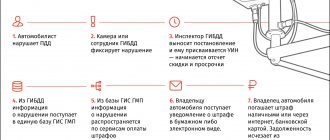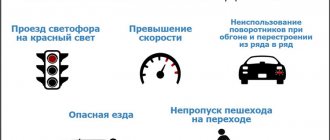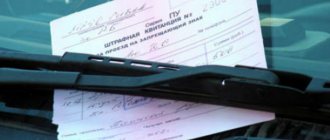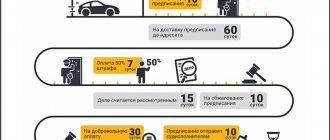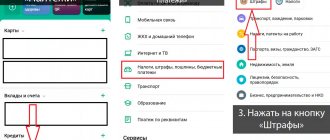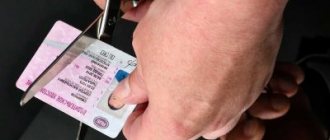Home/Appealing traffic police fines/Collection by bailiffs
The penalty for violating traffic rules is the imposition of fines. Their size is strictly regulated by the legislative framework of the Russian Federation and cannot exceed the established amount for each violation. The use of fines allows you to discipline car owners and motivates them to comply with existing traffic rules.
When can bailiffs collect a traffic fine?
Attention:
If 2 months have passed since the decision to impose penalties from the State Traffic Safety Inspectorate came into force, and the negligent driver has not repaid the debt, then the FSSP begins to collect the indicated amount. The documentation reaches the Federal Bailiff Service 10 days after the fine is issued. But the initiation of a case of forced collection begins only after the period allotted to the driver for voluntary payment of the receipt has passed (60 days, not counting the appeal period of 10 days, for a total of 70 days).
What happens in case of non-payment
Drivers who have been fined for violating traffic rules are given 60 days to repay the debt (clause 1 of Article 32.2). For law-abiding motorists who pay the fine within 20 days, there is a 50 percent discount. That is, the amount of the fine can be halved.
If the driver forgot to pay off the debt, he can expect unpleasant communication with representatives of the executive service. The fine is handed over to the bailiffs if the motorist does not pay it within 60 days and does not appeal within 10 days.
Rights and responsibilities of bailiffs
Representatives of the FSSP have the right to collect debt from the debtor, which includes:
Attention! If you have any questions, you can chat for free with a lawyer at the bottom of the screen or call Moscow; Saint Petersburg; Free call for all of Russia.
- the amount of the traffic police fine;
- the cost of the work of the FSSP representative;
- monetary penalties and sanctions imposed for violation of deadlines for payment of receipts;
- other penalties that are regulated by the current legislation of the Russian Federation.
Bailiffs can work closely with representatives of other government agencies and institutions to obtain the necessary information about the debtor and his location.
IMPORTANT
Representatives of the FSSP do not have the right to demand money from the violator in excess of the amount determined based on the analysis of each specific traffic police fine.
Rights and obligations of the debtor
After the violator receives a decision to pay a fine from the traffic police, he is obliged to repay the debt within 2 months. If the driver does not agree with the actions of the traffic police inspector, then you can appeal the decision on the offense within 10 days from the date of its issuance.
For your information
If it is impossible to repay on time, the driver can write an application to the traffic police with a request for a deferment. According to the Code of Administrative Offenses of the Russian Federation Article 31.5. it can be 1-3 months.
How does the traffic police receive information about payment of a fine?
Information about fines is stored in the State Information System on State and Municipal Payments (GIS GMP). The payment data does not immediately reach the treasury, but goes through several stages:
- The inspector issues a fine.
- The information goes into the GIS GMP.
- From there it is taken by services to pay fines, such as “Traffic Police Fines”.
- The driver receives a notification by mail and a paper letter in the mailbox.
- The driver pays off the debt.
- The bank transmits information about payment for government services to the GIS GMP.
- Information about the fine disappears from the GIS GMP database.
If the driver has not paid the fine or paid, but the payment was not included in the database by mistake, the traffic police inspector will transmit information about the fine to the FSSP.
If an error occurs when uploading data and the GIS GMP does not see the payment, the case will go to the bailiffs.
Payment procedure and terms
Traffic police officers do not have the legal authority to accept money from drivers intended to pay a fine. They only have the right to identify facts of non-compliance with traffic rules and issue a resolution indicating a specific amount that the violator must transfer to the state budget.
The driver independently repays the imposed fine through a bank or payment system that has access to the GMP GIS.
The procedure for collecting fines is regulated by Article 32.2 of the Code of Administrative Offenses of the Russian Federation, which allots 60 days from the date of the decision .
The procedure for collecting traffic police fines by bailiffs
The procedure for interaction between representatives of the FSSP and debtors is regulated by Federal Law No. 229 “On Enforcement Proceedings” dated October 2, 2007.
The entire procedure for collecting unpaid receipts for traffic police fines by bailiffs can be divided into several main stages:
- Transfer of documents. This occurs within 10 days from the moment the fine is issued. The resolution clearly indicates the amount of the traffic police fine, the date of the violation and information about the person who committed the violation of traffic rules.
- Waiting period. It is 2 months from the date of entry into force of penalties. During this period, the bailiffs do not initiate forced collection of the debt, giving the driver the right to voluntarily pay the due amount.
- If the violator persistently ignores the end of the period allotted for paying traffic fines and has not asked for a deferment in advance, then the bailiffs will begin the enforcement procedure. In this case, funds are transferred from the debtor’s bank account to pay the traffic police fine in favor of the state. If it is not possible to withdraw money from a bank card, an inventory and assessment of the debtor’s property takes place. Subsequently, the described property will be sold, and the proceeds will be used to pay off the debt.
Attention
Even at the stage of initiating enforcement proceedings, the debtor has the opportunity to voluntarily pay off the debt on traffic police fines.
How much can they withdraw from the card?
It depends on what type of card we are talking about. If we are talking about a regular debit card on which a person stores his personal savings, the amount of write-off can be maximum. In this case, the person will be charged the entire amount to pay off the debt. This is regulated by Art. 70 Federal Law No. 229.
More on the topic: A traffic police officer demands to take a rapid drug test - pee in a jar: does he have the right and what to do?
Funds can also be debited from a credit card. Since it is also attached to the current account of an individual. In some cases, the balance may even go negative if the banking system allows such operations. This is the worst option.
When bailiffs deal with wages, they can collect no more than 50% of labor income. This procedure is regulated by clause 2 of Art. 99 Federal Law No. 229. It is worth noting that we are talking specifically about wages. If a person stores different savings on one card, then the amount necessary to repay the debt will be written off from it. Except for the last payment, which is subject to a 50% cap.
You also need to take into account that the write-off amount will be greater than the actual fine. The bailiff service may charge an additional 7%, but not less than 1,000 rubles of the debt amount. This may also include the costs of enforcement proceedings, which are established on an individual basis in accordance with Art. 116 Federal Law No. 229.
Pay off fines in advance if they arise. This will not only help you avoid sudden debits from your plastic card, but will also protect you from the imposition of more serious penalties. In particular, the debtor’s car may be temporarily seized and sent to a fine yard if the amount of debt on fines and other penalties exceeds 10,000 rubles.
It is most profitable to pay off the fine no later than 20 days from the date of occurrence of the administrative offense. In this case, the driver can only pay 50% of the declared amount, and the fine will be removed.
Decision to initiate enforcement proceedings
The decision to initiate enforcement proceedings is made by the judge based on a petition from an authorized person. The violator is given a period of 60 days to voluntarily repay the debt. If payment is not received, a petition to initiate enforcement proceedings will be sent to the court. The period allotted for initiating enforcement proceedings to collect traffic police fines is 3 days. A copy of the judge's decision is sent to an authorized person and is also transferred to the FSSP.
Reimbursement order
If the fine was not paid on time, then FSSP representatives begin the forced collection procedure after 5 days. Consequently, within 5 days the driver has the last opportunity to pay the traffic police fine on a voluntary basis.
Experts advise keeping your payment receipt. Information about payment of a fine does not always enter the database in a timely manner. If the traffic police fine has already been paid, and the bailiffs begin the enforcement procedure and send the debtor a ruling on compensation, then you should immediately visit the FSSP. You must provide a receipt of payment, which will serve as evidence and grounds for termination of enforcement proceedings.
Attention
If the debtor’s payment deadline expires and the amount of the traffic police fine is repaid on time, then experts recommend immediately sending a copy of the receipt by registered mail to the bailiff service.
What if the bailiffs lifted the fine without notice?
Most often, funds are written off without the knowledge of the driver. But this does not mean that he was not notified. The bailiff service is obliged to send messages about the opening of enforcement proceedings, collection of funds, as well as about the arrest or debiting of funds from the personal accounts of individuals. faces.
As a rule, a corresponding letter is drawn up for any of these actions. He is sent to the driver’s place of residence, which is indicated in official documents. If a person does not check his mail, then he will not know about the existence of the enforcement case.
It is important to understand that the FSSP is obliged to notify the debtor in any convenient way. The driver will not be called on his phone, since this method is not practiced. Notifications come in the form of correspondence, so you need to check your mailbox at least once a week.
Occasionally, money may be written off due to confusion. Such cases have also been recorded. The fact is that the FSSP and the traffic police have different databases. When information passes from one source to another, unintentional substitution of persons may occur. For example, people with the surname “Ivanov” sometimes receive fines from complete tesks from other regions. In such a situation, you need to contact the FSSP service directly with a bank statement and personal documents. Such cases are considered on an individual basis.
More on the topic: When and why to “change shoes” for a car
Collection of administrative fines by the FSSP
The collection of administrative fines deserves special attention. According to the Code of Administrative Offences, 60 days are allotted to pay off an administrative fine. If payment is not made within the specified time frame, additional penalties may be applied to the violator (Article No. 20.25 of the Administrative Code). These include:
- increase in the amount of recovery by 2 times;
- arrest up to 15 days;
- compulsory work for up to 50 hours.
It is necessary to clearly monitor the repayment period of the traffic fine debt. If it falls on a weekend or holiday, the period is transferred to the next working day. Experts recommend that you independently calculate the final repayment period of the debt to avoid the imposition of repeated sanctions.
For your information
If the violator requests a deferred payment, he must pay the specified amount 2 days before the end of the term.
If established deadlines are violated, bailiffs actively interact with other government bodies. This allows you to find the violator and collect the debt from him.
What if the bailiffs wrote off the fine twice?
There is an explanation on this matter on the FSSP website. In short: if the bailiffs debited money from the account for the second time, most likely the bank did not transmit the payment data to the GIS GMP.
- Get a receipt from the bank. The driver must obtain a payment receipt from the bank.
- Collect documents. Take with you receipts for payment of both fines: from the traffic police and the FSSP. You will also need copies of the payment receipt and a certificate stating that there are no unpaid traffic fines.
- Submit a complaint. Bailiffs accept complaints in writing. The name and telephone number of the bailiff are indicated on the order. If you don’t have a resolution, contact the regional bailiff service.
- If the money is not returned or continues to be written off, complain to the bailiff. A citizen has the right to write a statement so that the FSSP checks the actions of a particular bailiff.
Visit to the territorial division of the FSSP
Enforcement proceedings for fines that were not repaid on time are initiated by the FSSP division at the place of registration of the debtor. Its address can be found on the official website of the department in the section
“Territorial bodies”. It is not recommended to delay your visit to avoid garnishment of your accounts or wages.
Confirmation of timely payment
The only confirmation that the driver paid the fine on time is a check or receipt with a bank mark indicating the date of the transaction. If you transferred money through online banking or the State Services portal, you can find the payment in the transaction history and print a receipt. But when paying at a bank cash desk or in cash through a terminal, you must keep the receipt for two years.
Is it possible to send a copy of the receipt for payment of the fine to the traffic police via the Internet?
On the traffic police website today there is no special form for sending scans of paid fine receipts, as was the case several years ago. If you find that your payment has not reached the recipient, you can write an appeal to the territorial division of the State Traffic Inspectorate on the official website of the department.
The application will be considered for up to 30 days . Therefore, if the case has already reached the bailiffs, the best option is to visit the territorial body of the FSSP with proof of timely fulfillment of their obligations.
How to return the overpayment amount
If the bailiffs withdrew money for the fine paid, this is a violation of your rights. The amount collected forcibly in this case is considered to be overpaid, therefore, in accordance with Article No. 70, Part 11 of Federal Law No. 229-F3, it must be returned to the account of the fine payer.
By default, no one will transfer anything back to you, so it is important to know how to return money from bailiffs . First of all, you should file a complaint demanding the return of the overpaid amount:
- the head of the territorial body of the FSSP;
- to the prosecutor's office;
- to court.
To the complaint it is necessary Attach a copy of the receipt for payment of the fine. traffic police The amount of the enforcement fee is also refundable.
Forced collection of traffic police fines by bailiffs
If the violator refuses to repay the debt on time, information about this goes into the GIS database. Based on this, the authorized person prepares an appeal to the court that issued the decision on monetary recovery. A copy of this document is automatically sent to the FSSP.
After receiving the appeal, the bailiff initiates enforcement proceedings, of which an official notification will be sent to the violator. From the moment of receipt of notification of the initiation of enforcement proceedings, the debtor has 5 days to voluntarily repay the debt. If the required amount is paid, then the enforcement proceedings for the forced collection of the traffic police fine will be terminated.
IMPORTANT
Even if the offender voluntarily repaid the fine within 5 days after the initiation of enforcement proceedings, he is also required to pay a mandatory fee. Its size is 7% of the fine, but cannot be less than 1000 rubles.
Considering that traffic police receipts are not very large sums of money, the debit can be made forcibly from the debtor’s bank card. The FSSP representative sends to the accounting department of the organization where the violator works a collection order and an order to withhold the specified amount in favor of the state.
If the offender does not have a permanent place of work, the bailiffs ask the tax service about the property, bank accounts and cards belonging to the debtor. If accounts are found, the bailiff sends a resolution and order to write off the funds to the banking institution. Then an inventory is made, forced seizure and subsequent sale in order to pay the fine.
What debts can be subject to joint raids by the FSSP and the traffic police?
During joint raids, bailiffs collect not only traffic police fines, but also other types of debts. For example, such events are regularly held to identify malicious child support providers who feel sorry for money to support their children, but don’t have enough money for an iron horse. A prerequisite for presenting any demands to the driver is the existence of enforcement proceedings. You must always remember that until it has been initiated, bailiffs do not have the right to demand debts.
The amount of debt and the reasons for its occurrence are important for determining the measures that bailiffs can take against the debtor if they catch him on the road. For example, if the amount of debt exceeds 10 thousand rubles, a FSSP employee may deprive the driver of the right to drive. If an overdue traffic fine is collected, then deprivation of a driver’s license is allowed for any amount of debt.
The procedure for collecting traffic police fines
Traffic police specialists are directly interested in conducting raids, since a significant part of enforcement proceedings are initiated based on their claims against people driving - fines for violating traffic rules (traffic rules). Traffic police inspectors cannot take money to pay off a fine at the scene of the offense.
The algorithm for holding a driver accountable is as follows:
- a protocol and/or resolution is drawn up describing the violation of traffic rules, an article of the Code of Administrative Offenses of the Russian Federation;
- if an article of the Code of Administrative Offenses of the Russian Federation allows for the drawing up of a resolution on the spot, a copy of the document is given to the driver;
- if the resolution cannot be drawn up on the spot, then the materials are sent to the court; the decision on the traffic police fine comes into force after 10 days if the driver has not filed a complaint (the procedure for entry into force is different for fines that are issued based on data from traffic cameras);
- 60 days are given to voluntarily pay the fine;
- for some violations, the driver can receive a 50% discount on the fine if he voluntarily pays it within 20 days;
- If the fine is not paid within 60 days, the documents are sent to the FSSP for forced retention.
Law No. 229-FZ provides for a special period for collecting a fine from the traffic police. The resolution is valid only for 2 years, after which forced collection is prohibited. For example, if the traffic police or the court sends a resolution to the FSSP after two years, the violator will avoid punishment.
You can pay the fine imposed by the traffic police from the bailiffs after the initiation of proceedings. Until 60 days have expired, the decision is in the traffic police or in court. Therefore, you can pay the fine before the expiration of 60 days using the details specified in the resolution. The statute of limitations for traffic police fines is not extended.
How long does it take for the traffic police fine to be handed over to the bailiffs for collection?
The interaction of the traffic police and courts with the bailiff service has been established as efficiently as possible. The decision on the fine will probably be sent to the FSSP as soon as 60 days have expired. Therefore, it makes no sense to expect that they will forget about your punishment and will not hand over the documents for retention.
FSSP and traffic police raids can be carried out to collect all types of debts
During a raid, bailiffs can accept payment via terminal or issue a receipt, but they cannot accept cash. During enforcement actions, the car may be seized, left in the custody of the debtor, or confiscated and sent to a impound lot.
Please note that the violator may be charged an enforcement fee by the bailiffs for the traffic police fine. Having received a ruling from the court or the traffic police, the bailiff will give the debtor 5 days to make voluntary payment. If the fine is not paid within this period, an additional fee will be charged. Its amount will be 7% of the fine amount, but not less than 1000 rubles.
Debtor search
Traffic police officers (MVD) can stop cars on the road as part of the search for a debtor who has been declared a bailiff. In this case, work is underway to identify a specific debtor person and his property. When declaring a search, the FSSP specialist can indicate the regions and cities in which the debtor may presumably be located.
If the traffic police officers find the debtor, then the deduction of debts will begin from him according to the general rules. If the debtor is caught on the road while driving, he most likely risks being left without a car. She will either be sent to a parking lot right in this region, where the driver was detained, and then an auction will be announced and sold to pay off the debt, and then the debtor will have to go home, as they say, on foot.
Or the car will be equipped with a special “beacon”, using which the bailiffs will be able to track the movement of the car to the region where the debtor, as they say, “inherited”. And upon the person’s return to his “native land,” the car will also be confiscated and sold.
Collection deadlines
If the debtor persistently hides from representatives of the FSSP (changed his place of work, place of registration or residence, etc.), then the statute of limitations for enforcement proceedings is 2 years. After this period of time, the bailiffs will not be able to recover the required amount from the violator.
That is, if from the moment the resolution comes into force, the bailiffs have only two years to find the debtor and forcefully collect from him payment of the traffic police fine. In this case, an inventory of property, seizure of securities, etc. can be carried out. After the end of 24 months from the date of entry into force of the resolution, it is not possible to collect the debt. (Article 31.9 Part 1 of the Code of Administrative Offenses of the Russian Federation).
Procedure for joint raids
The use of the “Traffic Bailiff” software package simplified the raid. If earlier traffic police inspectors had to selectively stop vehicles, today passing cars are recorded by special cameras installed in front of the location of State Traffic Inspectorate and FSSP employees. The program checks the databases of the bailiff service, the Federal Tax Service and the State Traffic Safety Inspectorate. If the car belongs to the debtor, the program reports this and the car is stopped.
The procedure for stopping a vehicle is regulated by regulations. It includes three mandatory points:
- if the driver is not the owner of the car, who is the debtor, but a person by proxy, no claims are made against him. All that law enforcement officers can do is to verbally convey the “news” to the owner of the car;
- representatives of the traffic police and the FSSP are required to introduce themselves to the driver of the vehicle and present their identification;
- Actions for forced collection of debt are carried out by the bailiff, not the traffic cop. The bailiff acts in accordance with law 229-FZ in compliance with the deadlines for notification and voluntary repayment.
If the bailiffs have not previously notified the citizen about the initiation of execution. production - he is given a decree against signature, and from this day 5 days are counted for voluntary payment. It is not necessary to pay on the spot, but for minor fines it is beneficial - if you do not repay the debt in 5 days, the bailiff will charge an enforcement fee - this is 7%, but not less than 1000 rubles.
After stopping the vehicle and presenting documents, events develop according to one of the following scenarios:
- The driver is informed about the existence of a debt with an explanation of the circumstances of its occurrence. Information can be easily verified - for example, you can find out the debt on the bailiffs website, which is loaded on a mobile device;
- it is possible to pay the traffic police fine from bailiffs using a terminal for non-cash payments (payment in cash during field raids is not practiced). During the transaction, be sure to check all the details - full name of the debtor, BCC, link to the writ of execution, etc.;
- if the driver is subject to a decision to deprive his driver’s license, the license is confiscated by the traffic police inspector;
- if a decree was previously issued to seize the car, the car is transported to an impound lot or transferred to the debtor for safekeeping.
Often the reason for stopping a car is not the driver’s duty, but a new traffic violation. The procedure described above must be followed: a protocol and/or resolution is drawn up, etc. There is no talk of paying fines in this case, since the driver is given a period to appeal the actions of the traffic police officer and the imposed punishment/recorded violation.
Is it possible to appeal the collection of a traffic fine by bailiffs?
Many motorists are interested in the question of whether it is possible to appeal the collection of a fine by the traffic police by representatives of the FSSP. This need arises if the receipt has been paid, and the bailiffs have written off the money from the card or current account, made an inventory of the property and seized it for the purpose of subsequent sale. To restore justice, you should submit an application to one of the authorities:
- FSSP to a senior manager (senior bailiff);
- Court;
- To the prosecutor's office.
In most cases, it is possible to resolve the issue by contacting the senior bailiff. Confirmation of payment of the debt must be provided, which will become the basis for termination of enforcement proceedings. If it is not possible to appeal the actions of the joint venture, then experts recommend filing a petition with the court.
For your information
It is advisable to contact the prosecutor's office if the actions of the FSSP representative are illegal and threaten the life or health of the offender (his family members).
How to protect yourself from fines for illegal parking?
With the increase in the number of vehicles, it is becoming increasingly difficult to find authorized parking spaces. In addition to prohibition signs, traffic rules provide for many restrictions. As a result, motorists are either forced to commit violations or pay for paid places. And it’s good when there is such an opportunity.
If you paid for paid parking, keep the documents for it. You may have to use them to challenge the issued fine:
- Certificates of benefits;
- Received receipt for payment for parking spaces;
- Screenshot of the payment message on the phone;
- A parking service agreement drawn up in accordance with the established procedure;
- Documents on making resident payments;
- Information about payments related to vehicle parking.
There are situations when difficulties arise with paying debts:
- There is no information about the payment.
- There is an error in the information entered.
- The resolution was drawn up for a fine issued with violations.
- A fine was issued for unauthorized parking.
If difficulties arise, you should contact an experienced lawyer. It will take a lot of time to compile the necessary documentation, prepare the evidence base, and complete it in accordance with legal requirements. During this time, traffic police fines may be collected by bailiffs.
Lawyers working in this area will competently advise you, study all the details, and choose tactics of behavior. Often, it is the actions of the lawyer and his client that determine the outcome of the case, and not the situation itself. At the initial stage, the question will be decided whether it is worth trying to appeal the issued decision at all and what violations can be pointed out in the actions of the traffic police officers. This way you will save your time and your nerves.
Step-by-step instructions for appealing
If the driver decides to appeal the collection of a traffic fine by the bailiffs, then he should follow a simple algorithm of actions:
- competently draw up an application for appeal;
- submit it within the deadlines established by law;
- obtain a court decision.
IMPORTANT
You can appeal only in the first 10 days after the violator learned about the repeated write-off of the debt (Article 122 of the Federal Law-229 “On Enforcement Proceedings”). In the future, you can appeal if the initial deadline was missed for a good reason. For example, due to illness.
The second, important point is the scrupulous preparation of an application to appeal the decision of the traffic police inspector. If the driver has difficulty filling out the form, it would be a good idea to seek the help of a professional lawyer. He will not only help you fill out the application form correctly, but will also suggest the correct model of behavior during the appeal process.
Payment via the site
In addition to checking the debt of the traffic police, on the FSSP website you can also immediately pay off your debt using one of the most convenient methods of transferring money. It's very easy to do this:
- First, you should click on the word “Pay”, which will be displayed in the table of information for a specific enforcement proceeding.
- Select the appropriate payment method and complete the transaction. The following options for transferring money are available on the FSSP website:
- from a bank card or phone account;
- through electronic payment systems (for example, WebMoney, Qiwi, etc.).
The record of enforcement proceedings will disappear from the FSSP data bank 3-7 days after the debt is repaid.
Application to appeal illegal collection of a fine
A completed application to appeal the illegal collection of a traffic fine by the Bailiff Service must contain the following information:
- The header should reflect the name and address of the institution where the driver is applying. Details of the offender (full name, registration or registration address). Information about the authorized person who issued the traffic police resolution.
- Name of paper. It may take the form of a petition or application to appeal the decision of the traffic police. The wording “about illegal actions of a representative of the FSSP” or “about the inaction of a representative of the FSSP service” is also possible.
- Fill out the body of the form. It should reflect information about the decision made. It is also necessary to indicate the date and place of seizure of property and describe the actions performed by the bailiff.
- Provide links to regulations that were violated by the bailiff. You should be especially careful at this point. If you are unable to find regulations on your own, you should seek the help of a qualified lawyer with extensive experience in handling similar cases. It would not be superfluous to record the consequences that resulted from the actions of the bailiff.
- Make a request to cancel the completed action. Add date and signature.
A prerequisite is the provision of the necessary package of documents. It includes:
- Correctly completed payment documents confirming the fact of repayment of debt on traffic police fines.
- A copy of the resolution of the bailiffs who carried out the forced collection of the debt;
- Other documents at the driver’s disposal that can confirm the applicant’s correctness.
For your information,
Experts recommend not delaying the payment process and not letting the situation get to the point where bailiffs are involved in collecting the debt under the traffic police fine.
to appeal the actions of the bailiff.
How to check administrative penalties through the FSSP website?
Sometimes, for a number of reasons, a driver may not know that he has a traffic police fine (how to check for fines?). At the same time, as you know, ignorance does not exempt you from responsibility. To avoid getting into such a situation, you should periodically check for administrative penalties.
So how do you do this? Which authority should I contact? Everything is quite simple. The following steps must be performed sequentially:
- Go to the official website of the FSSP (a link to it can be easily found through any search engine).
- On the page that opens, a sign will immediately appear - “Find out about your debts”, click on “Advanced search” and a questionnaire will appear. It should be filled out with the following information:
- search criterion (by individuals or legal entities, by number of enforcement proceedings or document);
- Driver's full name;
- date of birth (this field is not mandatory; data is entered into it if the system immediately issued several persons with the same full name);
- territorial authorities (the region in which the citizen is registered, his vehicle, etc. is indicated here).
- After entering the required data, click on the “Find” button.
The search results will be displayed on the screen. So, if a specific person does not have a traffic police fine or it has not yet been transferred to the FSSP, then the system will display the message “Nothing found for your request.”
If there is a debt, a table will appear on the screen displaying the following information:
- Full name and date of birth of the debtor;
number and date of initiation of enforcement proceedings;
- details of the resolution;
- date and reason for completing the case (this column is usually empty);
- the size of the traffic police fine;
- the name and address of the FSSP department that is dealing with the case of a particular person;
- Full name and contact number of the bailiff.
Controversial situations
A situation often arises when the debt has been paid, but information about this has not reached the FSSP. In this case, the bailiff may request information about the debtor’s accounts and cards from the banking system. And make a decision on forced debiting of money from the current account or card. If it turns out that the traffic police fine was paid twice, then the ideal solution would be to submit an application to the bailiff requesting compensation for damages. The previously paid receipt must be attached to the application. If the FSSP representative fails to act, experts recommend filing a complaint with the prosecutor’s office.
Is it possible to return money written off by bailiffs?
Another case when money is written off illegally is a “double” fine. In this case, the driver manages to pay the money for the offense within 60 days, but he does not submit the payment receipt to the traffic police. In turn, the report on the receipt of funds is not registered in the GIS GMP database. This can happen for various reasons. As a result, the fine is collected from the driver again, but through the FSSP.
Things like this don't happen often. But if you are faced with such injustice, do not be discouraged. The truth is on your side. However, you will have to fight for it. Depending on how much time has passed since the re-write-off, you can use two ways.
Method No. 1: through the FSSP
If you responded promptly, the money can be returned through the FSSP. The algorithm of actions in this case:
- Through the government services website or the FSSP portal, you can find enforcement proceedings regarding your fine. Specify the contact details of the contractor assigned to your case. As a rule, the bailiffs' website should indicate the work phone numbers of employees.
- Contact the responsible bailiff and explain the current situation.
- Make an appointment at which you need to show a receipt for paying the fine on time.
- If the FSSP did not have time to transfer the funds to the traffic police account, they can be returned. To do this, you need to fill out a free form application for a refund. In it you need to indicate the bank details of your plastic card.
More on the topic: Which bank has the lowest interest rate on a car loan?
Bailiffs are required to consider your application within 10 days. This provision is regulated by clause 11 of Art. 70 Federal Law No. 229. Return periods are not regulated. If the service is delaying the transfer of money to your account, you can contact the head of the FSSP unit directly.
Method number 2: through the traffic police
A more complicated situation is when the money has already been transferred from the FSSP accounts to the traffic police. In this case, the return algorithm will be slightly different:
- Request from the FSSP a copy of the payment documents for the transfer of funds to the traffic police.
- Find the Main Traffic Police Department in your city or region. It is there that you will need to submit an application for a refund of the “double” fine. A sample for filling out an application can be viewed on the website of the Ministry of Internal Affairs, or obtained at the place of application. The paper must state the reasons why the funds were withdrawn again.
- Attach to the application copies of: passport, original receipt for payment of the fine, TIN, documents from the FSSP, bank account statement about the debit of FSSP funds, plastic card details, and a copy of the resolution due to which the fine was assessed.
- Your application must be reviewed and the funds returned to the card.
If you contact the traffic police, the return period is also not regulated.
